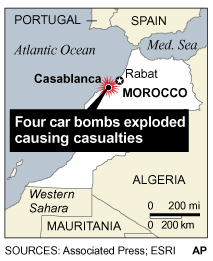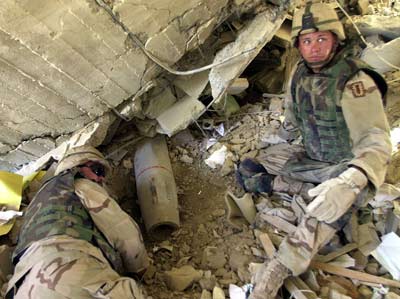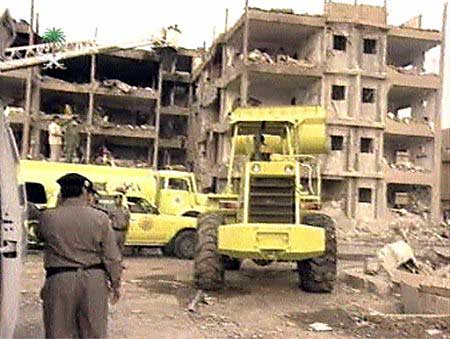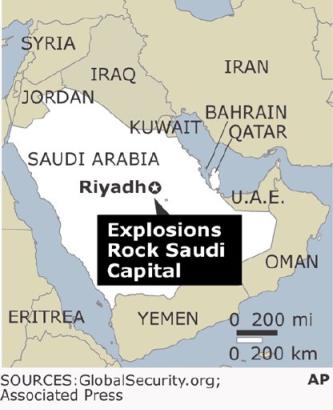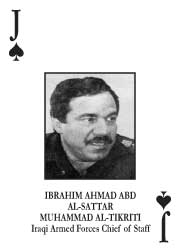From: Patti Patton-Bader
BlogUpdates
--------------------
U.N. Aid Agencies Security in Iraq
--------------------
By CHARLES J. HANLEY
AP Special Correspondent
May 14, 2003, 10:50 AM EDT
BAGHDAD, Iraq -- Faced with continued looting and thefts, local U.N. agency heads told the new American administrator in Baghdad that security must be reinforced quickly to protect food supplies and other elements of postwar recovery for Iraq.
The top U.N. humanitarian official in Baghdad said equipment at its water plants, for example, remains vulnerable to gangs of thieves, threatening restoration of supplies of clean water.
"From a U.N. perspective, our immediate concerns are related to security in the broad sense, law and order, not for us as persons, but for the society," Ramiro Lopes da Silva told reporters after a one-hour meeting with L. Paul Bremer, who took over Monday as chief civilian administrator for U.S.-occupied Iraq.
In a brief statement, Bremer focused on a U.S. request that an unspecified amount of Iraqi oil revenues, held in a U.N.-administered escrow account, be put toward buying the winter wheat and barley that Iraqi farmers are now harvesting.
Since the mid-1990s, those funds have been used to buy food imports under the "oil-for-food" program, devised to provide for Iraq's humanitarian needs while the country remained under U.N. economic sanctions.
"Mr. da Silva has agreed that we should plan on the World Food Program to spend that money starting as early as next week" on the homegrown cereals, Bremer said.
Da Silva, however, said reinforced security is closely related to purchases of the Iraqi harvest, "so we can move money, and technicians can go around and make purchases."
Iraqi officials say food warehouses have been among the targets of pillagers who stripped government buildings, banks and other sites of everything from commodities to cash to electrical fixtures, beginning when U.S. troops took control of Baghdad on April 9 and toppled the authoritarian Baath Party government.
Bremer's Office of Reconstruction and Humanitarian Assistance (ORHA) put out a call on May 4 for Baghdad police officers to report back to duty, and so far an estimated 5,000 of 9,000 have done so. The U.S. Army has sent in reinforcements -- 2,000 military policemen thus far for Baghdad, with 2,000 more expected soon.
The current numbers have not restored a sense of security in a city where people still openly loot and set arson fires, and where automatic gunfire resounds through the night.
"In some instances, actions are being taken along the lines we have indicated," da Silva said of the security measures. "In other areas, we are still looking for an improved security situation, like in some of the water plants, for instance, here in Baghdad."
Many U.N. offices in Baghdad were themselves heavily damaged by fire and looters in the aftermath of the U.S. military victory.
Scores of white sport utility vehicles, with "U.N." emblazoned in black on their sides, were stolen. To recover those vehicles, the U.N. office has fielded new vehicles painted in a hard-to-duplicate blue, so that any white U.N. vehicles seen driving around Baghdad can be instantly recognized as stolen.
The New York Times, meanwhile, reported Wednesday that the new U.S. administration for Iraq will now let U.S. forces shoot looters on sight to discourage the rampant lawlessness that has persisted for weeks.
Asked about the report, which cited unidentified American officials, Bremer said: "The existing rules of engagement have not been changed, to my knowledge."
Copyright (c) 2003, The Associated Press
--------------------
This article originally appeared at:
http://www.newsday.com/news/nationworld/wire/sns-ap-iraq-security,0,6392012.story
Visit Newsday online at http://www.newsday.com



